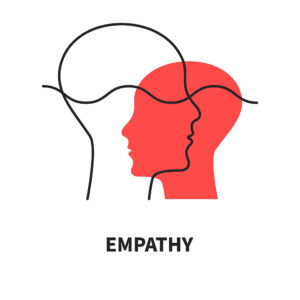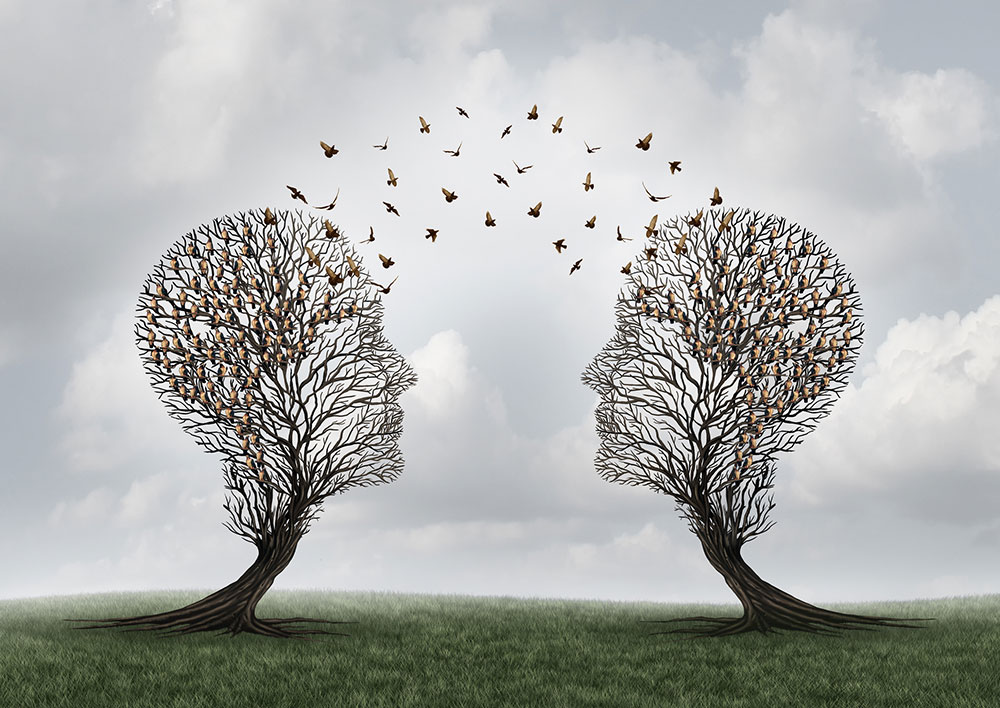For the speaker, the line between wanting to be reassured and wanting to be heard may not always be easy to discern.
Your friend is sharing how they had a difficult time at work with a colleague who was not forthcoming with information related to a time-sensitive project. Frustrated and upset, they convey the “events of the day.” You respond with a similar story about how annoyed you were with a colleague thinking it would bond the two of you with a shared difficulty.
Does this sound familiar?
Although most of us think we listen well, often we can’t wait to share our thoughts about what we’re hearing, which short-circuits the speaker from fully sharing their experience. I have been guilty of sharing a related story, thinking it would indicate my relatability around a similar challenge and engender solidarity. When I reflect on the exchange, I acknowledge the energy that took over and did not allow space for the friend to fully express what was emerging, then mentally kick myself. Aware that this is a tendency, I slip into when conversing with friends and family, I am being more intentional about not jumping in to share a story and attuning to the needs of the person speaking.
Many of us have mastered the appearance of listening, but it is not enough to maintain eye contact and reflect on what was heard. Listening is connecting with the speaker and engaging in a way that helps them feel understood. According to Nichols and Straus, to listen, well, it’s necessary to let go of what’s on our mind long enough to hear what’s on the other person’s mind.
 It is not as natural as we may think. Listening well, is a daily, moment-to-moment, person-to-person, practice. Energy, and attention to how we show up with each other create a compassionate, meaningful connection. This involves suspending our self-interest in the service of being receptive to the speaker’s needs.
It is not as natural as we may think. Listening well, is a daily, moment-to-moment, person-to-person, practice. Energy, and attention to how we show up with each other create a compassionate, meaningful connection. This involves suspending our self-interest in the service of being receptive to the speaker’s needs.
Listening is a complex process, compounded by modern distractions that further challenge our ability to genuinely listen. It requires taking in the information being communicated through the filters of both the speaker and listener, receiving, attending, understanding, and responding to what is being said, and for that matter, what is not being said. Noticing what limiting barriers are present can make a big difference. Trying to listen when you’re not up to it zaps our capacity to empathize. To connect.
Listening is an active process that takes effort. It is both a skill and an art, having a guide can be a helpful reminder of how to engage actively. While it is not a list of how-tos, it can be a tool to connect our entire body to the process. The heart of listening is empathy, an attunement, which is the essence of human understanding. A balance of thinking and feeling, being open to the somatic responses to what is being heard.
“Empathy — the human echo — is the indispensable stuff of emotional well-being.”
As is often the way with words that become familiar and overused, such as empathy, the sheer power of it can be oversimplified. One way to hold the essence of empathy is that it is an appreciation that is conjured up for the inner experience of another person, the bridge that strengthens relational bonds. We can’t give what we have not either given ourselves or have received. Tuning into ourselves allows us to extend the same generosity.
 Building good relationships requires listening, and deep listening promotes empathy. The privilege of listening to another’s experience is a powerful way of moving closer to each other, transcending the relationship. I have been gifted the opportunity to coach more than 1,000 individuals, centering listening, inviting the client to explain their viewpoint, then seeking permission before presenting mine.
Building good relationships requires listening, and deep listening promotes empathy. The privilege of listening to another’s experience is a powerful way of moving closer to each other, transcending the relationship. I have been gifted the opportunity to coach more than 1,000 individuals, centering listening, inviting the client to explain their viewpoint, then seeking permission before presenting mine.
I started this article a few days before connecting with a friend for brunch whom I had not seen for about a year. Friendships are voluntary and reflect how we show up in the world with care and mutuality. The everyday human exchanges and the moments shared include daily observations, joys, obstacles, and dreams, which unburden the sense of isolation. This time, I’m happy to say that I was not mentally kicking myself on the drive home!
How well are you listening? Take this quiz and find out.
The difference between listening well and not listening well is the difference between being seen and seen with smeared glasses. How we interrelate, transfer information, connect, validate, acknowledge, hear, and listen is fundamental for our longing to belong. When I engage my heart and mind — the whole body — to be fully present for the speaker, there is this magical connection. Listening is a process that asks us to extend grace to each other, staying open to understanding what is being shared.
Nichols & Straus writes, “to be with other people authentically is no easy feat. This ability depends on an awareness of ourselves as self-contained individuals who relate by listening to and accepting other separate and autonomous individuals.” Listening is an outgrowth of extending care, to ourselves and another tied to our well-being.
May you have the gift of being listened to.
May you offer the gift of listening to another.
May we listen well.
——-
Resource List:
Nichols, M.P. and Straus, M.B. (2021) The Lost Art of Listening: How Learning to Listen Can Improve Relationships (3rd Edition). Guilford Press.
Stone, D., Patton, B., and Heen, S. (2010) Difficult Conversations: How to Discuss What Matters Most. Penguin Books.
Book A Discovery Session
 A discovery session is largely influenced by a kaizen process, which is a philosophy based on the concept to change for the better through small modifications creating improvements. The session is centered on learning about one another including values, goals, and processes.
A discovery session is largely influenced by a kaizen process, which is a philosophy based on the concept to change for the better through small modifications creating improvements. The session is centered on learning about one another including values, goals, and processes.
The discussion will help determine our chemistry match and how collaborating will add value for you. There will be an opportunity to understand your needs and what is top of mind for you, especially what is it that you wish to improve upon. This is an opportunity for us to co-create a win-win partnership.
Some discovery session questions are:
- What is your biggest challenge as it relates to ______?
- How are you feeling about this challenge?
- What about solving the challenge is most important to you?
- How will you benefit from finding a solution to this challenge?
To schedule your no obligation appointment, email novelette@betacoachingconsulting.com or visit our calendar to book an available time.

This Month’s Books:
Fuller’s search for belonging (understanding) to his biological family, the affinity felt with his caregiver, and all the ways he strived to belong and didn’t feel it speaks to his personal triumph given the racial prejudice endured.
There is a silencing, a constant restraint, that the author exercised in the spaces where he found himself disenfranchised, “so it was easier for me to think that any shabby treatment I received was because I was in care rather than because I was black.”
 The son of Jamaican Windrush Generation immigrants in the UK, Michael Fuller, experienced being singled out or being regarded as different is the core of his memoir, A Search For Belonging. Leaning into his intellect and professional acumen, Fuller excels in the Britain Police Force – one could say despite tension experienced because of his race.
The son of Jamaican Windrush Generation immigrants in the UK, Michael Fuller, experienced being singled out or being regarded as different is the core of his memoir, A Search For Belonging. Leaning into his intellect and professional acumen, Fuller excels in the Britain Police Force – one could say despite tension experienced because of his race.
The epilogue unpacked the circumstance of his biological family and the emotional, psychological, and psychosocial difficulties of migrating to another country. “People brought up by their own relatives are told the stories, the mythology, of the family, and they carry this around inside them all their lives, defining who they are and where they came from.”
 Catching the Light (Why I Write) contains fifty intimate vignettes of Harjo’s life’s journey. For me reading her words break my heart open.
Catching the Light (Why I Write) contains fifty intimate vignettes of Harjo’s life’s journey. For me reading her words break my heart open.
She has a way of drawing this reader in as if the words were written from a deep abiding place connecting me to her experiences. I feel such resonance with this book, and anyone who has read Harjo’s work knows she does not leave anything out. She writes from a deeply honest and vulnerable place.
“We are all as actors, wearing the masks of family, generation, or occupation. We step into the story when we take our first breath. We will lay down the masks when we return to the spiritual jumping-off place.”
What have you read lately that broke your heart wide open, touching that tender spot, connecting you deeply to yourself?




